
Moviegoers apparently love an underdog, at least when it takes the form of Ryan Reynolds’ Avengers wannabe Wade “Deadpool” Wilson. Deadpool & Wolverine, the biggest R-rated movie of all time, with more than a billion at the global box office, co-stars Hugh Jackman and comes fully loaded with a slew of superheroes newly arrived in the Marvel Cinematic Universe now that Disney owns the studio that once controlled the rights to X-Men and other comic book characters.
The action comedy is scripted by Reynolds, director Shawn Levy, Zeb Wells, and writing partners Rhett Reese and Paul Wernick, who first started collaborating as teenage movie nerds growing up in Phoenix, Arizona. After Reese and Wernick broke out in 2009 with Zombieland, Reynolds enlisted them to write Deadpool, followed in 2018 by Deadpool 2.
Speaking from their homes in Los Angeles, Reese and Wernick identify the man they call “The Elevator,” break down the cameo selection process and speculate about why their new movie struck such a huge chord with audiences.
How does it feel to be co-writers of the biggest R-rated movie in history and the most popular film so far of 2024?
Paul: I’ll let you in on a little secret. We debuted the movie at Comic-Con Hall H, and it was the greatest theatrical experience of our lives. We had an audience of 6500 people laughing and oohing and ahhing at the exact same time. It was more fun watching the audience than actually watching the movie. Then I came home – – and this is going to be embarrassing…
Rhett: Oh no.
Paul: My kids and I made a graph chart, the box office and the calendar, and now I’ve got this chart hanging over my bed in the master bedroom with the [box office] results…
Rhett: This is what not to do if you come out to Hollywood and want to be a happy person.
Paul: It feels amazing, I guess is the short answer.
Why do you think this movie has resonated with audiences in such a robust way?
Rhett: Hugh and Ryan together are like a Reese’s cup where the chocolate and the peanut butter meet together, and it’s just the right taste.
Paul: Not to bring down the room, but I also think there is an element of dread in the world these days. Between politics and life and everything else, Deadpool & Wolverine provides an escape to a fantastical world and gives people a reason to forget what’s going on outside the dark room they’re sitting in for two hours and seven minutes. We’re such a disparate society now; everybody doesn’t like everybody, and no one sees eye to eye on stuff, so here’s a movie where you can sit in a theater full of people you don’t even know and laugh with them. That feels good for everybody, especially us, who helped create the world.
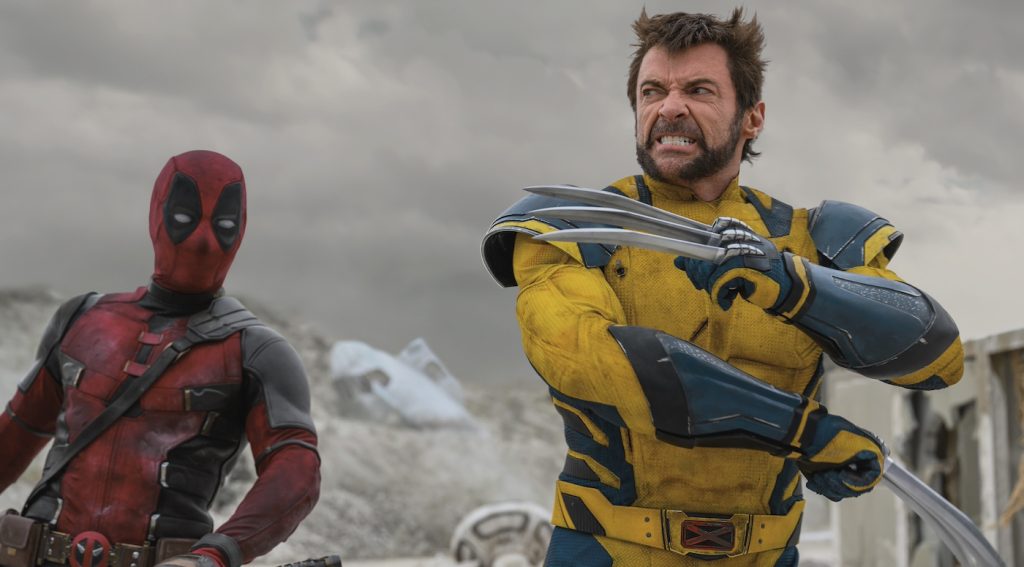
You’d been trying out different ideas for a third Deadpool movie when Hugh Jackman called and said he wanted to play Wolverine. The only problem is that Wolverine is dead and buried at the end of 2017’s Logan. How did you develop a plot that would bring Wolverine back from the dead?
Rhett: Thankfully, we had this history set up in recent Marvel projects of a multiverse with variants of the same character who live in different universes and proceed down a slightly different path. It quickly became clear that we could use the Time Variance Authority and this place called the Void to take advantage of Marvel story elements that people already understand.
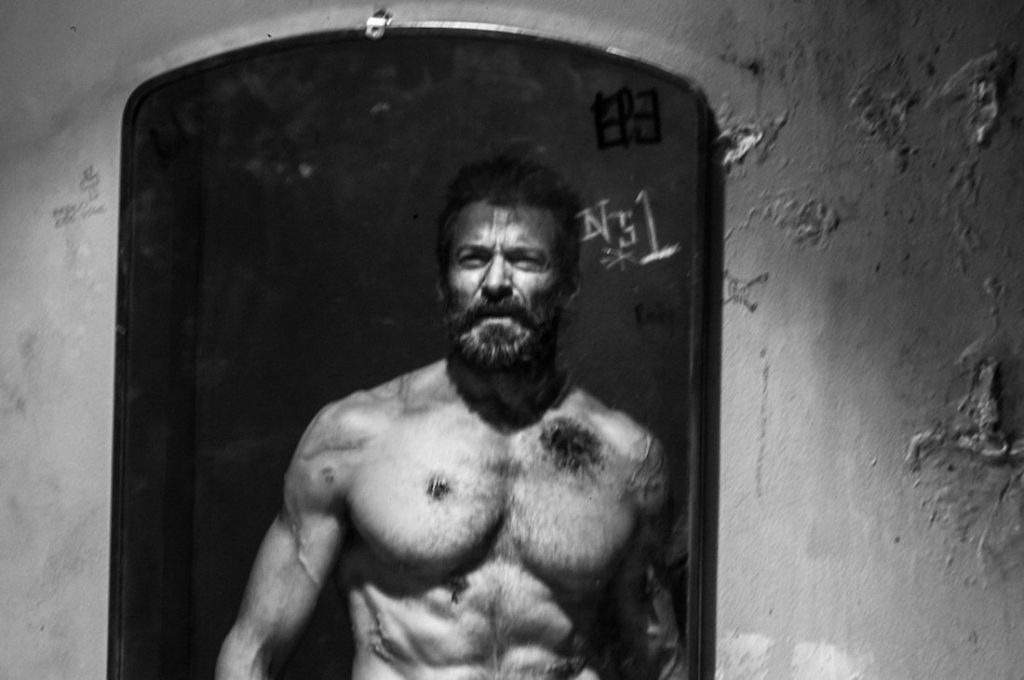
Borrowing primarily from the Loki TV series?
Rhett: Mostly from Loki. Yeah. The idea of variants and multiverses also gave us a nice way to transition back to: “Okay we’re all on one timeline again” and because Disney bought Fox, we’ve got some new characters merging within the MCU. We’re going to have X-Men, we’re going to have the Fantastic Four, we’re going to have Wolverine. That was super exciting.
The friction between Deadpool and Wolverine drives the story in classic odd-couple fashion. Were you inspired by old-school action comedies in this vein?
Paul: For sure. Planes Trains and Automobiles, Midnight Run, 48 Hours — we grew up with that kind of mismatched R-rated road trip comedy. Once Hugh came aboard, it almost didn’t matter what the movie’s plot was, right? Deadpool and Wolverine have to get from point A to point B but their interactions are the plot of the movie in a sense. You can understand the Marvel plan and the Time Ripper and the Void, but when you boil it all away, what I tell my folks, who don’t know anything about the Marvel universe, is that it’s about the journey of two guys who learn to become more accepting of one another. It’s about friendship. That’s the core of the movie, and yes, we were highly inspired by these comedies of the past.
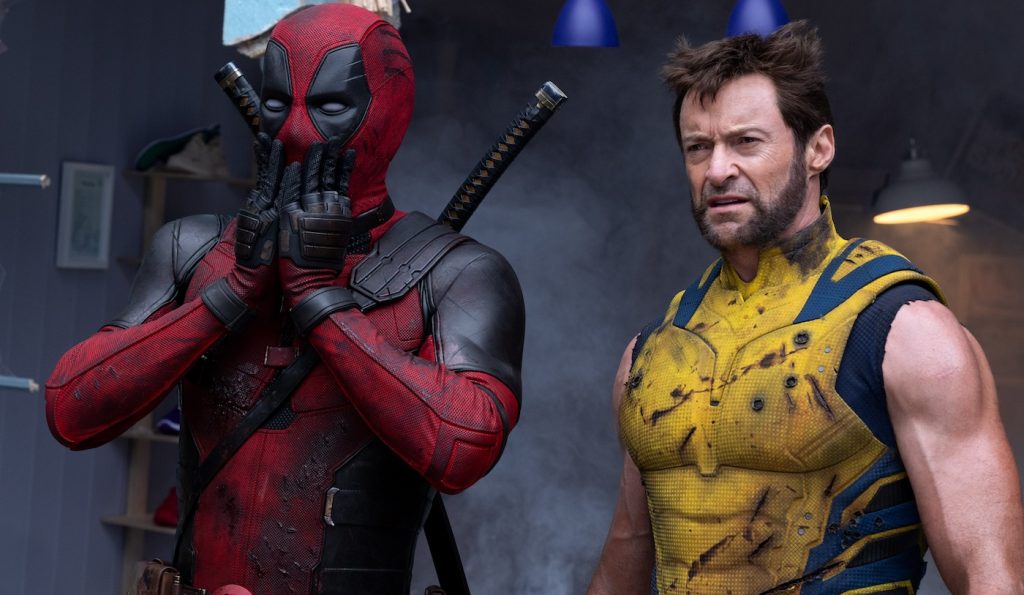
You guys have functioned as a two-person team for decades, and now, here you are, collaborating with three other writers. How did that go?
Paul: Shawn and Ryan have also been writing together for about 15 years now, so there’s a bit of a hive mind. We were essentially Zooming our way through it to break the story with Ryan being sort of the bottleneck that everything runs through. He was like the showrunner, making sure all the pieces fit. We’ve had this character living in our heads since 2009, when we started writing the first Deadpool, so to have Ryan’s voice both in our heads and on screen in Zoom calls was invaluable.
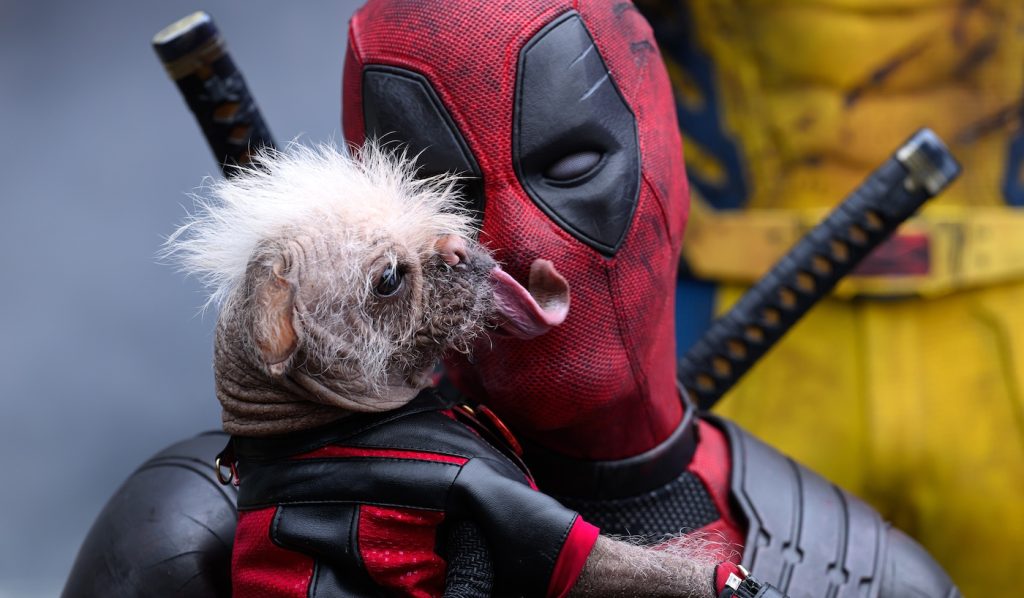
Invaluable and likely entertaining?
Paul: Always. We call him “The Elevator” because Ryan elevates everything he touches. In the edit bay, on set, in the writing process. [Co-writer] Zeb [Wells] is terrific, too, so the comedy was kind of the easiest stuff to come by because there were a lot of funny people around. Then it becomes about making sure the story makes sense, giving it heart, and having Hugh and Ryan bring it to life.
How did you sketch out the character arcs for Deadpool and Wolverine?
Rhett: To us, it felt a little like being in rehab with two lost souls who ended up there for very different reasons. Wade’s having a mid-life crisis. His real goal was to be part of a larger team, the Avengers, but he dropped out because he didn’t feel like he mattered anymore. In Hugh’s case, he dropped out for more macabre and horrifying reasons in that he’d failed to defend his friends, taking revenge and killing people who perhaps didn’t deserve it. Through their friendship, this irreverent lunatic and the hard-boiled, angry guy find meaning, a place where they don’t loathe themselves.
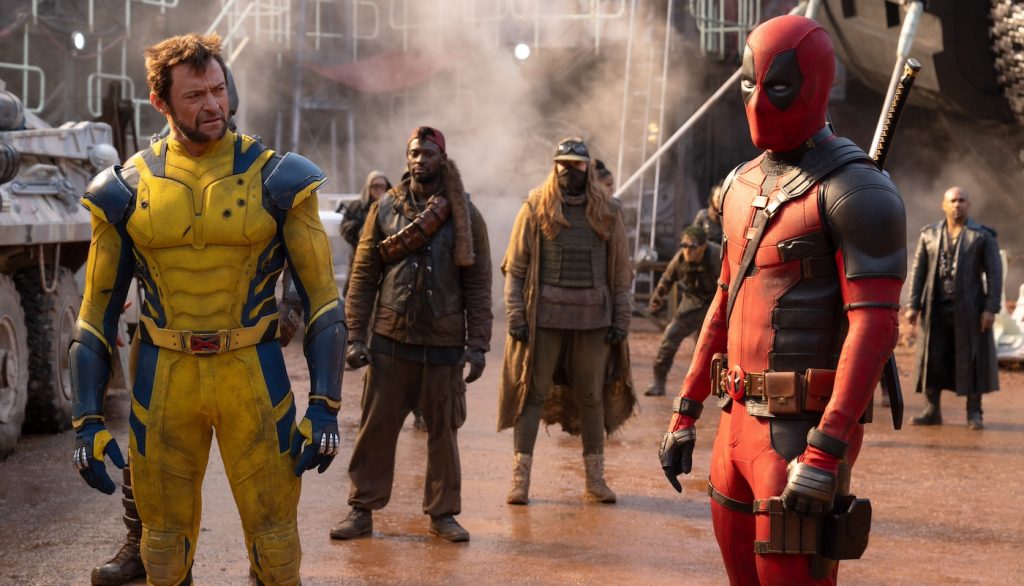
SPOILER ALERT
Fans have gone wild over The Deadpool & Wolverine cameos. How did you figure out which Marvel characters deserved a cameo?
Paul: For us, it was about “Which superhero characters from the Fox universe got screwed?” Blade, Wesley Snipes just kind of got… screwed. Elektra [Jennfer Garner]. . . got screwed. Quite honestly, Channing Tatum [who repeatedly tried and failed to make a Gambit movie] as Gambit — by never getting screwed, he got screwed. We literally looked at IMDb pages to see who hasn’t had the heroic proper ending that we can now put on the Mount Rushmore of Fox superheroes.
It’s one thing to write a cameo but actually getting the actor who plays that character to commit might be more complicated. Did you get everybody you wanted?
Paul: The great news for us is that Deadpool comes with a lot of cool, so when Ryan picks up the phone or writes an email, the answer is usually “Yes.” We’d be like, “Okay, how about Chris Evans as Johnny Storm?” You literally hear the keyboard tapping on the other end, Ryan typing a text to Chris Evans. “Yeah, he’ll do it.” Chris had done a cameo for Ryan in Free Guy, and Ryan did one for Chris in Ghosted;they’re buddies, so then Chris has to make a deal with Marvel. We stay out of that. Once they figure it all out, Chris comes on set and gets fitted for the Johnny Storm suit.
Rhett: Paul pitched that idea of the mislead, where you think Chris Evans is Captain America, and it turns out he’s Johnny Storm. Almost from the jump, even before Hugh [joined the cast], everyone was: “That’s going in the movie.”
There are so many funny bits in this movie. Do you have personal favorites?
Rhett: The thing that’s probably nearest and dearest to me is the minivan fight. My wife and I bought a Kia Carnival for our kids, so the idea of Deadpool and Wolverine being trapped together inside a minivan, the most bland place to ever fight, saying horrible things to each other, and then Deadpool setting off Wolverine one too many times with the word “Gubernatorial” — that’s probably my biggest contribution.
You two have spent 15 years dreaming up Deadpool stories. Where do you go from here?
Paul: Deadpool never dies; that’s his superpower. We’re constantly being surprised by this franchise and the underdog keeps rearing its literally ugly head. So, who knows? I’ll just say we’ve done a trilogy, and if that’s all we write, great, move down the road. But if we get called back in by the coach, we’ll probably answer the call.
This article was first published on The Credits